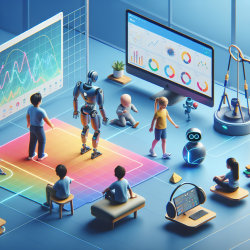Artificial Intelligence (AI) is revolutionizing various fields, and speech-language pathology is no exception. The recent research article "Impact of AI-Powered Solutions in Rehabilitation Process: Recent Improvements and Future Trends" by Khalid et al. (2024) offers valuable insights into how AI can enhance rehabilitation outcomes. Here, we delve into the key findings of the study and discuss how practitioners can leverage these advancements to improve their therapeutic interventions.
Personalized Rehabilitation Apps
One of the most significant advancements highlighted in the study is the development of personalized rehabilitation apps. These apps use reinforcement learning (RL) algorithms to tailor interventions to individual needs. For instance, an AI-powered app designed for dementia patients can adapt its cognitive exercises based on the user’s performance, making the therapy more effective.
Rehabilitation Through Assistance
AI is also making strides in providing physical assistance through robotics. For example, social robots equipped with AI can assist children with developmental disorders in performing daily activities. These robots use machine learning algorithms to adapt their interactions, making them more engaging and effective.
Virtual Reality-Based Rehabilitation
Virtual Reality (VR) offers immersive environments that can simulate real-life scenarios for cognitive and motor skill training. The study highlights the use of VR in treating conditions like stroke and neurodegenerative diseases. VR-based interventions provide a safe and controlled environment for patients to practice skills, thereby enhancing their rehabilitation outcomes.
Rehabilitation for Neurological Disorders
AI-driven cognitive-behavioral therapy (CBT) platforms are showing promise in treating neurological disorders such as depression and anxiety. These platforms use machine learning to adapt therapeutic exercises based on the patient’s progress, making the therapy more personalized and effective.
Challenges and Future Directions
While AI offers numerous benefits, there are challenges to its adoption, including cost, trust in technology, and access. Moreover, AI should complement, not replace, human expertise. Future research should focus on addressing these challenges and exploring new opportunities for AI in rehabilitation.
Conclusion
AI-powered solutions are transforming the rehabilitation landscape by offering personalized, adaptive, and effective interventions. Practitioners can leverage these advancements to improve therapeutic outcomes for their patients. To read the original research paper, please follow this link:
Impact of AI-Powered Solutions in Rehabilitation Process: Recent Improvements and Future Trends.
